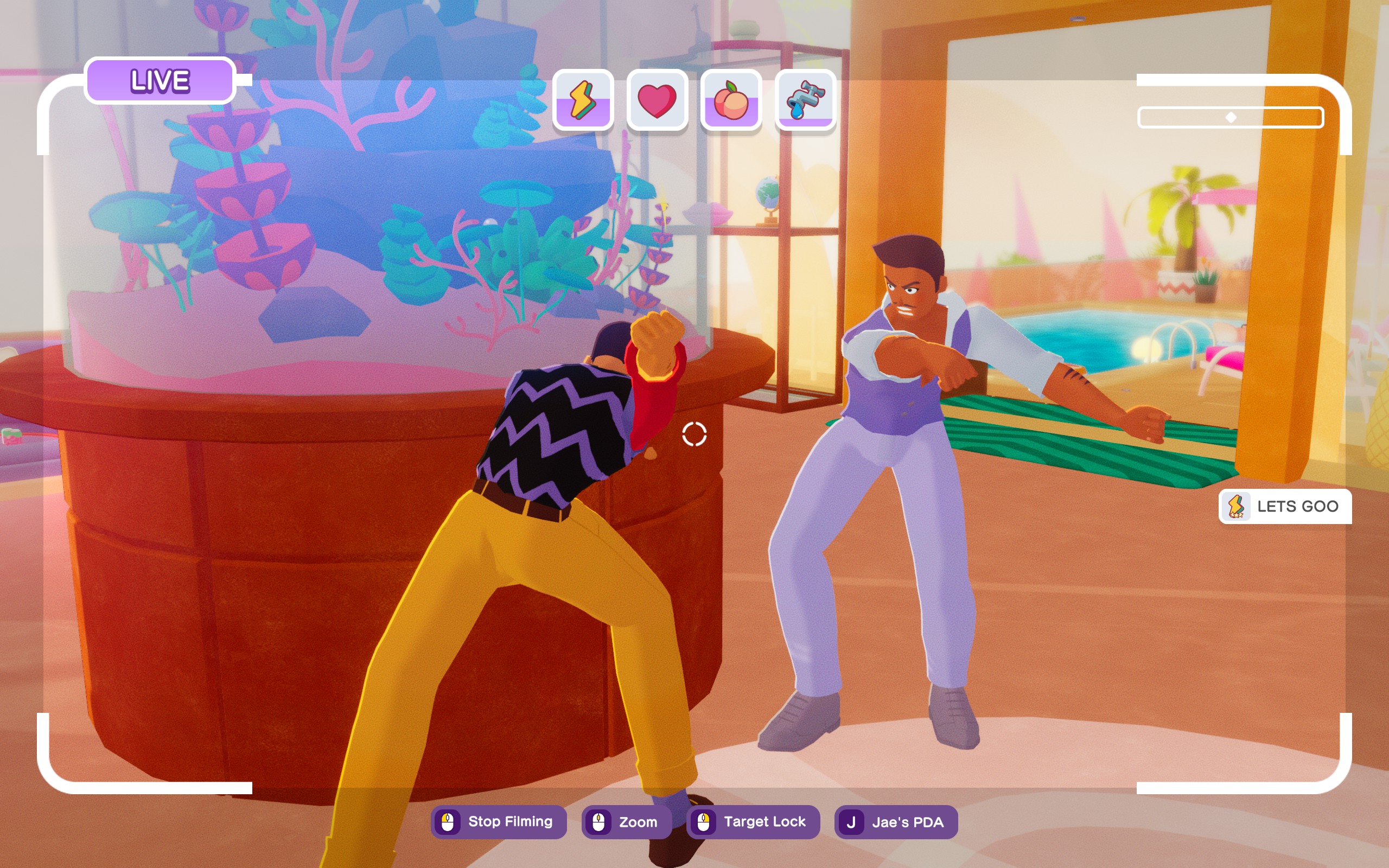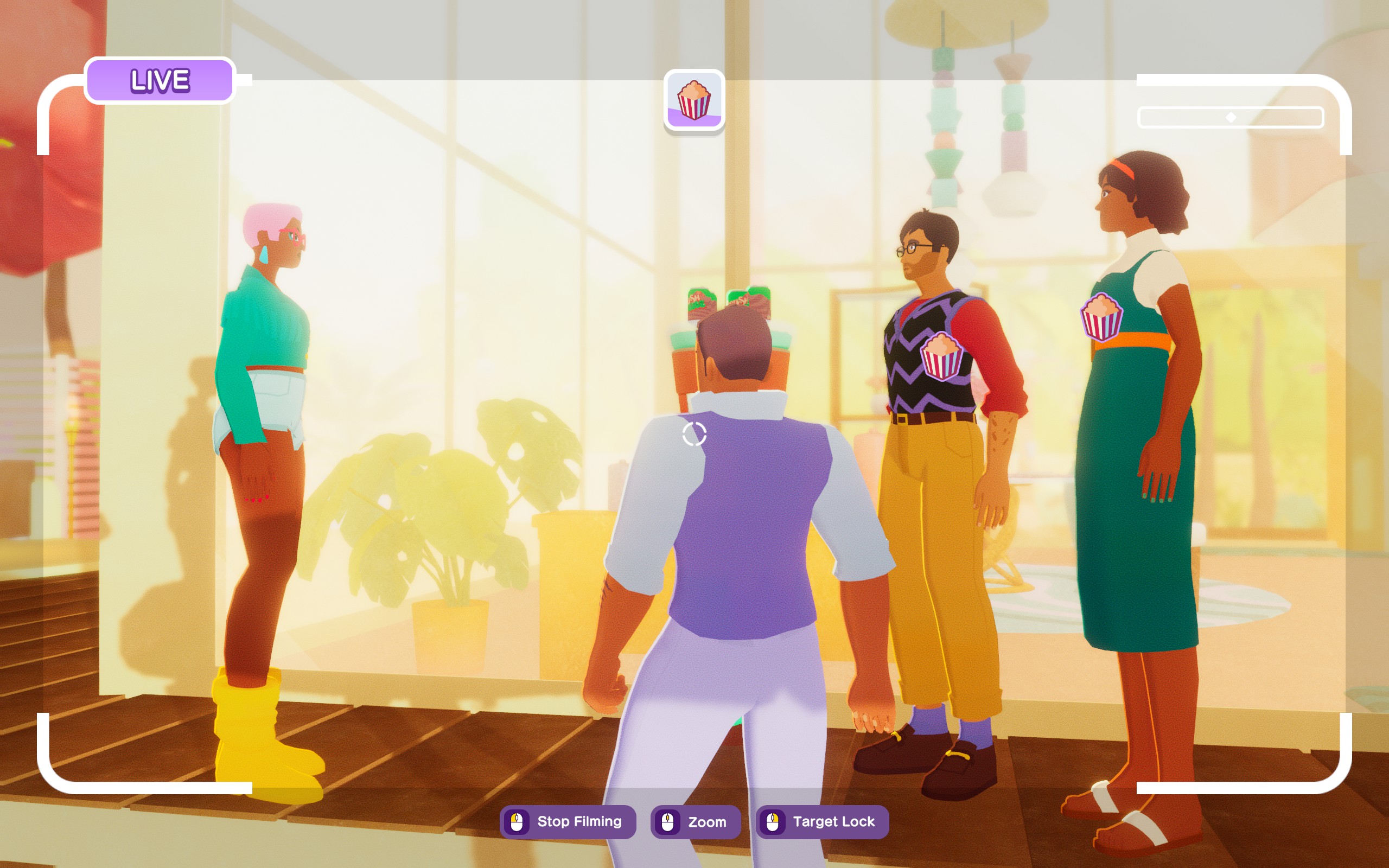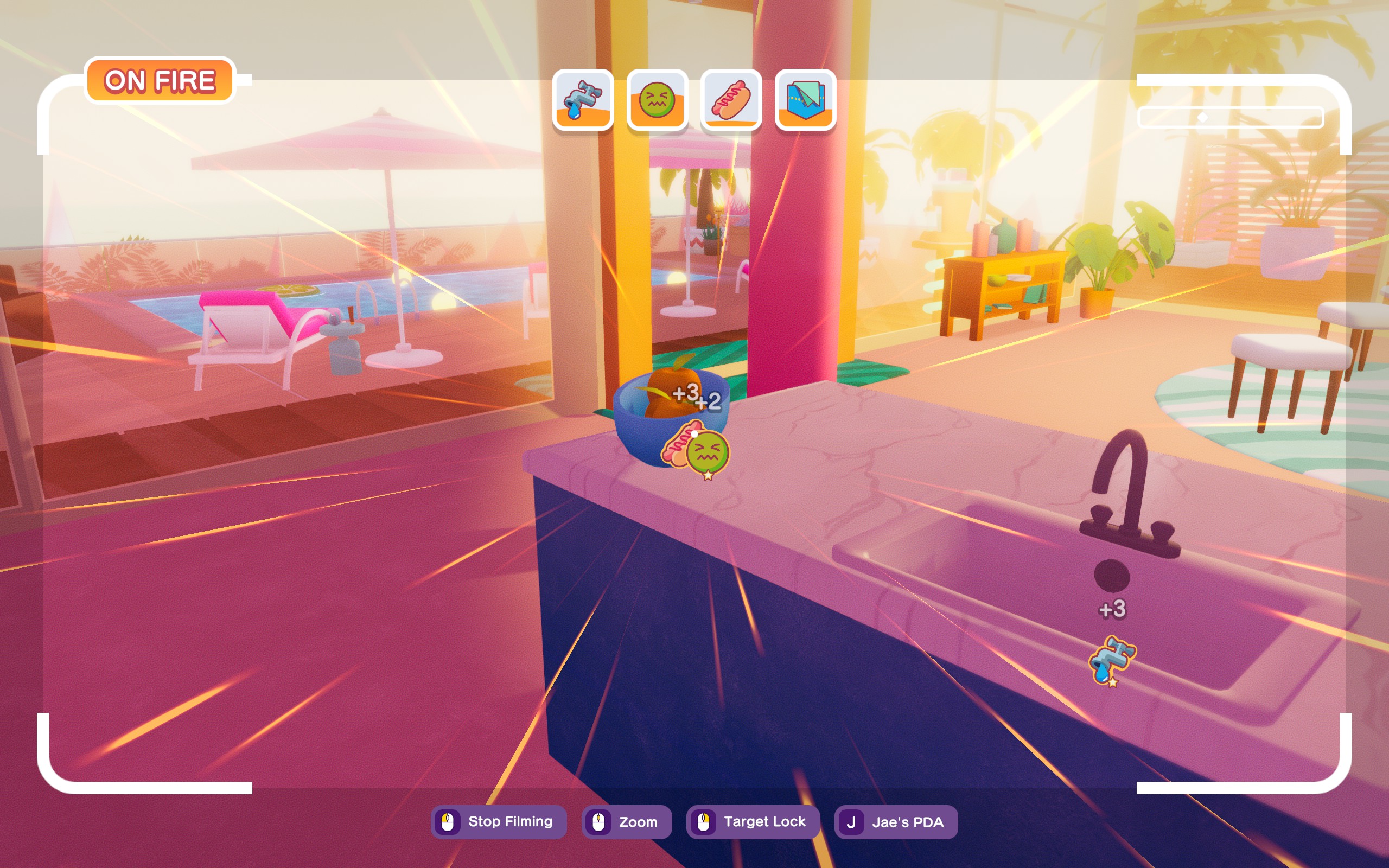Crush House is a parody of reality TV with nothing real to say about its subject
Welcome to the museum of social decay.

When the Crush House audience includes Drama Queens, Butt Guys, and Plumbers, I make the viewers real happy by filming a fight that breaks out in front of the aquarium—so long as I film it from a certain angle. The other two audiences have obvious wants, but the Plumber demographic really just likes to see a water feature in the shot. Plumbers are in the audience again on another day, this time alongside Foodies and The Motion Sick. The ratings really shoot up when I point the camera at the kitchen, which has a bowl of fruit by the sink, and just hold it there for a good long while.
Crush House is a satire of reality TV that divides the audience up into niches, then gives you a set amount to satisfy each day. On days when Voyeurs are watching you can easily rack up points by filming cast members in the Malibu island house from an extreme distance—or when they fall asleep by the pool—but on days when Voyeurs aren't watching there's no point getting those particular creepy shots. Which is why you sometimes get days when you find yourself ignoring the cast to film a lighthouse (to please the Pharologists), a machine that serves branded Crush Juice (the Conspiracy Theorists are obsessed with it), and a cactus that looks like a cock and balls (for the Teens demographic).
While you're filming, audience comments appear in real time. They're often clues, letting you know Film Students want to see a high-angle shot and Divorced Dads would love to see the barbecue in action. You technically can't be filming all the time because ads only show when you put the camera down. Ads aren't that important, however. At the end of each day failing to satisfy the audience target means the show gets canceled, while the number of ads you squeeze in just determines the budget you get for buying props. Which can be useful—the Teens want to see someone use a pool shower, and there are Fish Freaks who will be happier if you buy fish for the aquarium—but keeping the show on the air is obviously the most important thing.
If you fail to hit a target rating, you have to restart the whole day. And that's where Crush House starts to fall apart. The four housemates you choose for each season come from a pool of 12, and have their own personality traits, likes, and dislikes. Based on those traits they'll react to props around the house as well as each other, bonding and fighting and reconciling and making out. When you have to repeat a day, or make it to your second or third season—each only lasts a week—you'll start to see scenes repeat only with different characters involved. The conversation where someone makes a joke about finding "fun powder" hidden in the house, or the scene where the resident hottie assures the shy one they just want to be friends, will happen with completely different characters so long as they've got the right traits to fill in the blanks.
That, combined with an art style that's pure Corporate Memphis, makes it difficult to care about the characters. It doesn't help that many of them are portrayed as shallow, fame-hungry dolts. Yet when the curtain comes up and the dark secrets of the Crush House begin to be revealed, you're obviously supposed to care what happens to these simulated dipsticks.

Crush House has a second layer, which begins at night. When the cameras are off—this is apparently a reality show where nothing happens after dark—cast members will break the rules and ask you for help. Their silly requests, like wanting to be filmed playing a musical instrument or while kissing two other cast members, begin a storyline that reveals the Crush House has a darker underbelly than the kind all reality shows do.
It's tough to spoil because it's so wilfully vague that even at the end of the game I didn't 100% know what was really going on. It doesn't help that I can't go back and try the finale again to see the second of its two endings. There's no manual saving, the only save point is after you make the final choice, and even changing the difficulty setting—which normally resets the whole day—won't take me back any further.
The biggest gaming news, reviews and hardware deals
Keep up to date with the most important stories and the best deals, as picked by the PC Gamer team.

That final frustration makes it hard to find nice things to say about Crush House. It pokes a little fun at the audience and stars of reality shows, but in a toothless way that feels half-hearted. The closest thing to savagery is saved for the network, but they're portrayed as distant and faceless and responsible for such an over-the-top Soylent Green conspiracy that it's impossible to take seriously. The real problem with these shows is how they're edited to make real people into cartoon villains for the audience to hate, but Crush House's bizarre livestream format means there's none of that in the game. As a work of satire it's as unfocused as the wide-angle shots it encourages you to compose just so you get everything in the frame.

Jody's first computer was a Commodore 64, so he remembers having to use a code wheel to play Pool of Radiance. A former music journalist who interviewed everyone from Giorgio Moroder to Trent Reznor, Jody also co-hosted Australia's first radio show about videogames, Zed Games. He's written for Rock Paper Shotgun, The Big Issue, GamesRadar, Zam, Glixel, Five Out of Ten Magazine, and Playboy.com, whose cheques with the bunny logo made for fun conversations at the bank. Jody's first article for PC Gamer was about the audio of Alien Isolation, published in 2015, and since then he's written about why Silent Hill belongs on PC, why Recettear: An Item Shop's Tale is the best fantasy shopkeeper tycoon game, and how weird Lost Ark can get. Jody edited PC Gamer Indie from 2017 to 2018, and he eventually lived up to his promise to play every Warhammer videogame.

